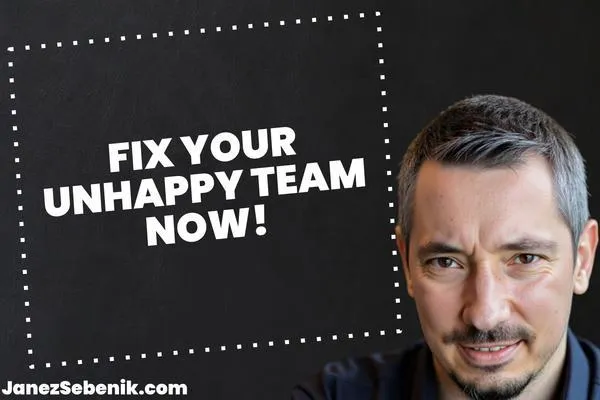
How to Boost Morale and Fix an Unhappy Team
An unhappy team can drag down your whole business. But don't worry, it's fixable.
You need to spot the signs early. Look for low energy, complaints, and missed deadlines. These are red flags.
Spotting the Signs of an Unhappy Team
You need to know what to look for. Teams don't just wake up miserable one day. There are telltale signs that things are going south. Let's dive in.
High Turnover Rates
People jumping ship? That's a red flag. When good employees start leaving en masse, something's up.
Watch for:
Sudden increases in resignation letters
Key players quitting without notice
A revolving door of new hires
High turnover is like a fever. It's your team's way of saying, "We're not okay." Don't ignore it.
Lack of Team Cohesion
Remember when your team used to gel? If that's ancient history, you've got a problem.
Signs of a fractured team:
Cliques and exclusive groups forming
Less collaboration on projects
Increased conflicts and disagreements
When your team stops working as a unit, productivity tanks. It's like trying to row a boat with everyone paddling in different directions.
Decreased Productivity
Is your team's output dropping faster than a lead balloon? That's a classic unhappy team symptom.
Look out for:
Missed deadlines becoming the norm
Quality of work taking a nosedive
People doing the bare minimum
Happy teams crush goals. Unhappy ones? They struggle to even show up.
Poor Communication
When the chatter dies down, trouble's brewing. Unhappy teams clam up.
Red flags include:
Meetings where no one speaks up
Important info not being shared
Increase in misunderstandings and mistakes
Good communication is the lifeblood of any team. When it dries up, your team's health goes with it.
Communication: The Bedrock of Team Satisfaction
Clear communication is key to keeping your team happy and productive. It's the glue that holds everything together. Let's break it down into bite-sized chunks.
Fostering Open Dialogue
Want to fix your unhappy team? Start by creating a space where everyone feels heard. Encourage your team to speak up without fear of judgment.
Set up regular one-on-ones with each team member. This shows you value their input.
Create anonymous feedback channels. Some folks are shy, give them a way to share their thoughts.
Celebrate when team members voice their concerns. It builds trust and openness.
Remember, communication is a two-way street. You gotta give to get.
Mastering the Art of Active Listening
Ever feel like you're talking to a wall? Don't be that wall for your team.
Active listening is your secret weapon. It shows respect and builds stronger relationships.
Here's how to do it:
Make eye contact
Nod and use verbal cues
Paraphrase what you heard
Ask follow-up questions
Avoid interrupting. Let your team members finish their thoughts.
Practice empathy. Try to see things from their perspective.
Remember, listening isn't just hearing. It's understanding and validating.
Consistency in Team Meetings
Meetings can be a drag, but they're crucial for team alignment. Make them count.
Set a regular schedule for team meetings. Consistency builds trust and expectation.
Keep it short and sweet. Aim for 50 minutes or less.
Create an agenda and stick to it. Share it before the meeting so everyone can prepare.
Encourage participation. Call on quieter team members for their input.
End with clear action items. Who's doing what and by when?
Follow up after the meeting. Send a quick recap of decisions and next steps.
Building Trust Within Your Team
Trust is the glue that holds high-performing teams together. It's what lets you take risks and achieve big things. Let's dive into how you can build that trust as a leader and empower your team.
Gaining Credibility as a Leader
Want your team to trust you? Start by walking the talk. Be consistent in your words and actions. If you say you'll do something, do it. No excuses.
Set an example for your team. Show them what integrity looks like in action. Be open about your own mistakes. It shows you're human too.
Communication is key. Be clear about expectations. Give feedback, both good and bad. But do it with kindness. Your team needs to know where they stand.
Create a safe space for ideas and concerns. Listen actively. Don't just hear, but really listen. It shows you value their input.
Empowerment Through Autonomy
Micromanagement kills trust faster than a speeding bullet. Give your team room to breathe. Let them make decisions.
Encourage open communication. Create channels for sharing ideas freely. But don't force it. Let it happen naturally.
Trust your team with important tasks. Delegate real responsibilities. It shows you believe in their abilities.
Set clear goals, not rigid methods. Let your team figure out the how. They might surprise you with innovative solutions.
Celebrate wins, big and small. Recognize effort, not just results. It boosts confidence and encourages risk-taking.
Setting and Managing Expectations
Clear goals and accountability are key to fixing an unhappy team. When everyone knows what's expected, it's easier to stay on track and feel good about the work.
Clear Goals and Objectives
You gotta set crystal-clear goals. No wishy-washy stuff. Make 'em specific and measurable.
Here's the deal:
Write down exactly what you want
Put a number on it
Set a deadline
For example: "Boost sales by 20% in Q4." Boom. Everyone knows the score.
Team goals should be front and center. Put 'em on a big board. Talk about 'em in meetings. Make sure your crew knows what they're aiming for.
Break big goals into smaller chunks. It's like eating an elephant - one bite at a time. Small wins keep people fired up.
Holding Everyone Accountable
You've set the goals. Now what? You gotta hold people's feet to the fire. In a nice way, of course.
Regular check-ins are your best friend. Don't wait for the yearly review. That's ancient history.
Try this:
Weekly team huddles
Monthly one-on-ones
Quarterly progress reviews
Give clear feedback. Good or bad, people need to know where they stand. Be straight up, but kind.
Celebrate wins, big and small. Did someone crush their target? Shout it from the rooftops. Or at least in the team chat.
When things go sideways, don't point fingers. Ask, "What can we learn?" It's about fixing the problem, not placing blame.
Boosting Team Morale and Engagement
Happy teams are productive teams. Let's dive into some killer ways to pump up your crew's spirits and get them fired up about work.
Recognition and Positive Feedback
Want to light a fire under your team? Start dishing out praise like it's going out of style.
Catch your people doing something right and shout it from the rooftops.
Regular one-on-one check-ins are your secret weapon here. Use them to give props for a job well done.
Don't wait for the big wins. Celebrate the small victories too. Did someone nail a tricky client call? High five time, baby!
Set up a quick kudos system. Maybe it's a Slack channel for shoutouts or a weekly email blast highlighting rockstar performances. Whatever floats your boat.
Remember, recognition isn't just about work stuff. Notice when your team's crushing it in their personal lives too. New hobby? Kid won a spelling bee? That's worth a pat on the back.
Creating a Supportive Environment
Your team needs to feel like they've got your back. So how do you make that happen?
First off, be available. Open door policy isn't just a fancy phrase. Mean it. When your people need you, be there.
Foster a no-blame culture. Mistakes happen. Instead of pointing fingers, focus on solutions. Ask "What can we learn?" not "Who screwed up?"
Encourage teamwork like your business depends on it (because it does). Set up collaboration tools that make working together a breeze.
Create chances for your team to bond outside of work. Maybe it's a monthly game night or a volunteer day. Fun breeds trust, and trust breeds killer teamwork.
Lastly, invest in your team's growth. Offer training, mentorship, or even just a killer book recommendation. Show them you're all in on their success.
Optimizing Team Performance for Long-Term Success
Want to crush it with your team? Let's dive into two game-changing strategies that'll skyrocket your performance and keep your squad happy.
Cultivating a High Performing Culture
First up, culture. It's not just a buzzword, it's your secret weapon.
Start by setting clear, attainable goals. Make sure everyone knows what they're aiming for.
Next, celebrate wins – big and small. Did someone nail a presentation? Shout it from the rooftops!
Communication is key. Keep those channels open and flowing. No secrets, no BS.
Encourage risk-taking. Yeah, you might fail sometimes, but that's how you learn and grow.
Lastly, lead by example. Show up, work hard, and be the change you want to see. Your team will follow suit.
Ongoing Training and Development
Now, let's talk about leveling up your team's skills. Continuous learning isn't just nice to have – it's essential.
Start by identifying skill gaps. What do your people need to crush their goals?
Offer a mix of training options. Some folks love workshops, others prefer online courses. Cater to different learning styles.
Don't forget about soft skills. Communication, leadership, problem-solving – these are game-changers.
Encourage peer-to-peer learning. If you have an Excel wizard on your team, let them teach others their tricks.
Lastly, make learning fun. Gamify it, offer rewards, or create friendly competitions. When learning feels like play, everyone wins.

